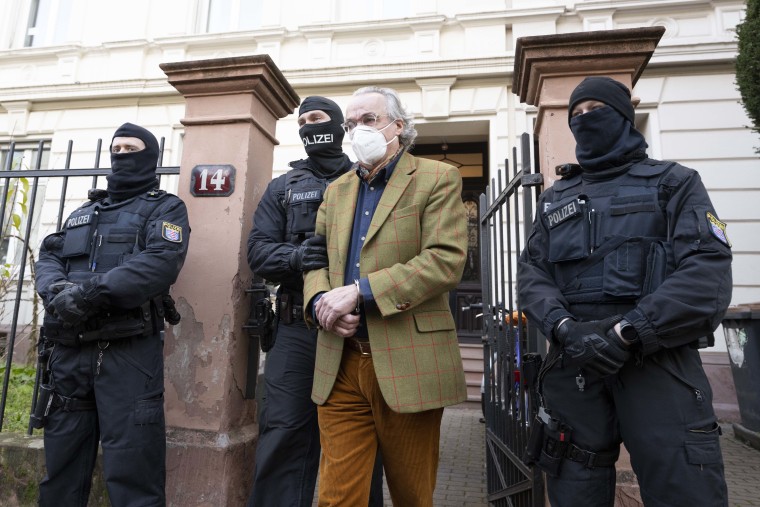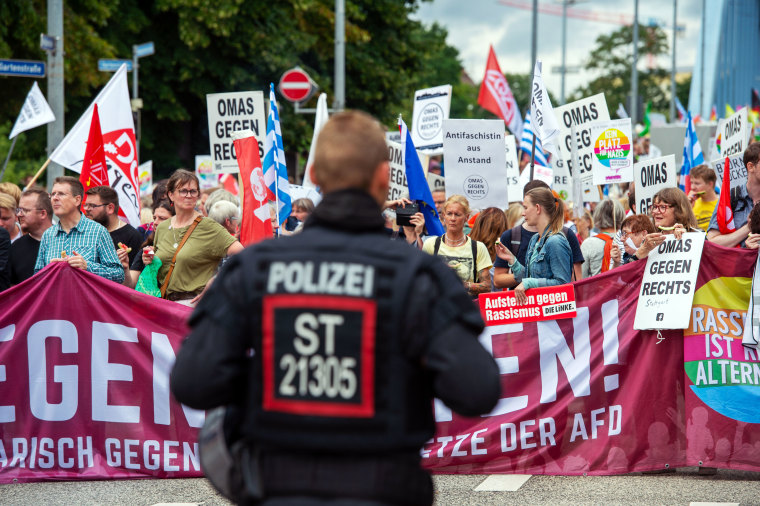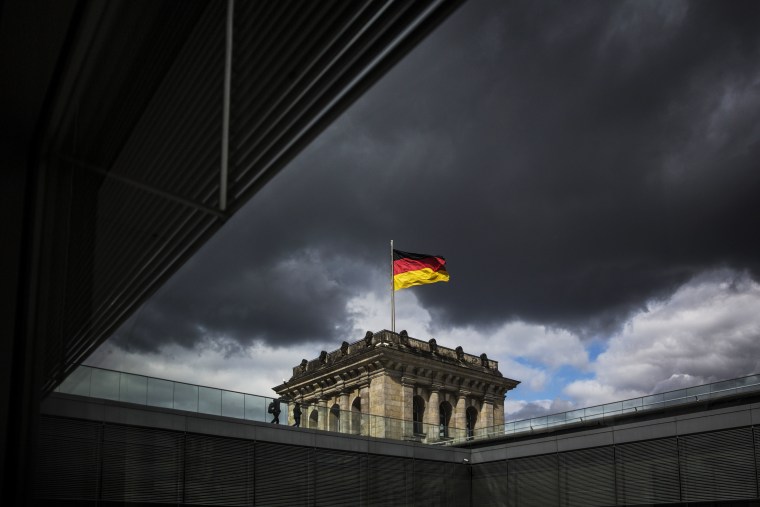A former German lawmaker who also served as a judge led members of a far-right terrorist group that was plotting to overthrow the government on a tour of the Reichstag, home of the country’s parliament, according to prosecutors.
The new allegations come as Germany faces the most serious challenge by a far-right party since World War II, one expert said, with the hardline Alternative for Germany, or AfD, party climbing to second place in opinion polls.
The former lawmaker at the center of the alleged coup plot belonged to the AfD, which is enjoying greater mainstream success even as the country’s intelligence chief warns it is becoming more extreme.
Reconnaissance tour
The charges, released Monday in a filing from Germany’s Federal Court, allege that three members of the far-right Reichsbürger movement toured the Reichstag parliament building in Berlin in September 2022 and took photos and video of nearby government offices — authorities say this was preparation for a violent attack.
Three months later, 25 people from the Reichsbürger movement were arrested after police discovered details of a planned armed coup in the advanced stages of planning, including a government structure to replace Germany’s federal republic.
One of those charged Dec. 7 served as a lawmaker for the AfD from 2017 to 2021, which gave her the right to enter the Reichstag along with up to six others. The document does not name the suspect but mentions that she had been a judge in Berlin.
“Everyone involved in this operation knew that it could only be carried out by using deadly force of arms against the police and security forces of the German Bundestag,” the document said, referring to Germany’s federal parliament.
The group planned for 16 people to force their way into the building, the court document said, and had acquired weapons, hundreds of rounds of ammunition and restraining devices. The former lawmaker was found to have a revolver and a semi-automatic rifle with a telescopic sight, as well as around 7,000 cartridges, according to prosecutors.
Another person charged with involvement in the coup is a former commander of a parachute battalion in the Bundeswehr, Germany’s armed forces.
Some have ridiculed the Reichsbürger group for its eccentric, mostly older members, including its alleged leader, Heinrich XIII Prince Reuss, with his obscure and archaic royal title. Reuss descends from the House of Reuss, which controlled a portion of eastern Germany until the formation of the modern country after 1918.
He has repeated an antisemitic conspiracy theory about Jews being responsible for the end of European kingdoms and believes that the current German state is illegitimate and void because of agreements made with Allied forces after World War II.
“In Germany itself, there were quite a few people who said, ‘Was this really serious? Look at the people, look how old they are.’ Like they were basically crazy pensioners,” Peter Neumann, an expert on extremism in Germany at King’s College London, told NBC News.
“The reality is, we’re now seeing the hard evidence that they were actually trying to plan a serious operation, to have guns, to scope the building.”

Inspiration from America?
The Reichsbürger plotters were heavily influenced by the QAnon conspiracy theory and may have taken direct inspiration from the storming of the U.S. Capitol in Washington on Jan. 6 2021, according to Neumann.
“There is an inspirational link,” he said. “Ever since the storming of the Capitol, we’ve seen the storming of Parliament in Brazil, we’ve seen these people in Germany trying to plot to storm the parliament in Berlin. And I do think it creates a very powerful image for how far-right people could take power.”
The involvement of AfD lawmakers in the Reichsbürger movement has fueled concerns about the rise of the far right in a country that has sought to grapple with its 20th century past.
The AfD was founded 10 years ago as a euroskeptic right-wing party, but has since expanded to become the main vehicle for those disillusioned by mainstream politics or radicalized by conspiracy theories.
This week, the head of Germany’s intelligence agency said the party had become increasingly extremist and anti-democratic.
Thomas Haldenwang, president of the Federal Office for the Protection of the Constitution (BfV), said in an interview with the German press agency DPA on Monday that some of the party’s parliamentary candidates expressed “far-right extremist conspiracy theories.”
These included the “great replacement” theory, which holds that Western leaders of predominantly white nations are importing nonwhite people to permanently alter their demographics.
The party held a conference in the central city of Magdeburg over the weekend, which “once again confirmed our assessment that there are strong anti-constitutional currents within the party, whose influence is increasing,” said Haldenwang, who has warned previously of the threat from the party and its youth wing, which is officially designated an extremist group.
One of its lawmakers, Peter Boehringer, accused Haldenwang of abandoning his neutrality and demanded a correction.
“The long-standing suspicion that the BfV is primarily involved in party-political smear campaigns against the AfD has thus become a certainty,” he said. The AfD referred NBC News to this statement and declined to comment further.
The AfD has seen a surge in its support this year, helped in large part by strong backing in the east of the country.
Opinion polls give the party a 21% vote share, behind only the center-right Christian Democratic Union (CDU) on 27%, but ahead of the center-left Social Democratic Party (SDP) on 18%, led by Chancellor Olaf Scholz.

There is no federal election until 2025, but the party’s progress has still dominated recent political debate in Germany.
“I don’t think, in post-war German history, there has ever been a far-right party as strong as the AfD is now. So in that sense it is a great concern,” Neumann said.
The leader of the CDU, Friedrich Merz, caused outrage last month when he suggested that his party could potentially work with the AfD in local administrations. After an outcry from members, he insisted there would be no cooperation on a municipal level, after all.
On Friday and Saturday thousands took to the streets in Magdeburg to protest against the AfD during its conference.
The party is undeterred.
“Germany has understood that the right is the future,” one of its co-leaders, Alice Weidel, told the Italian newspaper la Repubblica on Saturday. “The voices are getting louder.”

